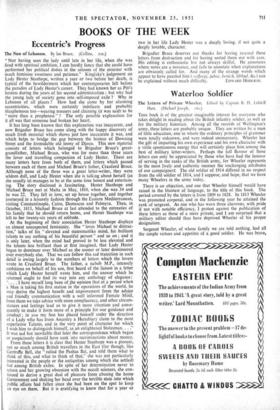BOOKS OF THE WEEK
Eccentric's Progress
The Nun of Lebanon. By Ian Bruce. (Collins. 21s.) " Nor having seen the lady until late in her life, when she was fired with spiritual ambition, I can hardly fancy that she could have performed her political duties in the saloons of the minister with much feminine sweetness and patience." Kinglake's judgement on Lady Hester Stanhope, written a year or two before her death, is typical of the bewilderment which her contemporaries felt before the paradox of Lady Hester's career. They had known her as Pitt's hostess during the years of his second administration ; but why had the young lady of society gone into self-imposed exile ? Why in Lebanon of all places ? How had she come by her alarming eccentricities, which were certainly indelicate and probably blasphemous too—wearing trousers and claiming (it was said) to be " more than a prophetess " ? The only possible explanation for it all was that someone had broken her heart.
It has long been known that this explanation was inaccurate, and now Brigadier Bruce has come along with the happy discovery of much fresh material which shows just how inaccurate it was, and which helps to bridge the gap between the hostess of Downing Street and the formidable old loony of Djoun. This new rrtaterial consists of letters which belonged to Brigadier Bruce's great- grandfather, Michael Bruce, who was for more than three years the lover and travelling companion of Lady Hester. There are many letters here from both of them, and letters which passed between each of them and Michael Bruce's father, Cranford Bruce. Although •none of the three was a great letter-writer, they were seldom dull, and Lady Hester when she is talking about herself (as she usually is) manages to be at the same time honest and entertain- ing. The story disclosed is fascinating. Hester Stanhope and Michael Bruce met at Malta in May, 1810, when she was 34 and he was 22. They fell in love, set up house together, and together journeyed in a leisurely fashion through the Eastern Mediterranean, visiting Constantinople, Cairo, Damascus and Palmyra. Then, in October, 1813, Michael Bruce at last attended to the entreaties of his family that he should return home, and Hester Stanhope was left to her twenty-six years of. solitude.
At the beginning of their association Hester Stanhope displays an almost unsuspected femininity. She " loves Michael to distrac- . tion," talks of his " elevated and statesmanlike mind, his brilliant talents to say nothing of his beautiful person " and so on ; and it is only later, when the mind had proved to be less elevated and the talents 'less brilliant than at first imagined, that Lady Hester began to domineer over Michael as she sooner or later domineered over everybody else. That we can follow this sad transition in such detail is owing largely to the numbers of letters which the lovers wrote to Crauford Bruce. The father, a nabob M.P., intensely ambitious on behalf of his son, first heard of the liaison in a letter which Lady Hester herself wrote him, and the answer which he returned ought to find its way into any anthology of elegance: ". . I have myself long been of.lhe opinion that at a period when a Man is taking his first station in the operations of the world, he may derive the highest benefit and improvement from the advice and friendly communication with a well informed Female Mind, from them we take advice with more complacency, and other circum- stances and feelings lead us to give it more attention and conse- quently to make it form more of a principle for our guidance and conduct ; in you my Son has placed himself under the direction of a Lady who has from Ancestry a Hereditary claim to the most superlative Talents, and in the very point of character for which I wish him to distinguish himself, as an enlightened Statesman. . . ." It was sad but inevitable that later the correspondence which began so auspiciously should have sunk into recriminations about money. From these letters it is clear that Hester Stanhope was a pioneer, not so much among British travellers in the East (for though, like Gertrude Bell, she " rolled the Pashas flat, and told them what to think of this, and what to think of that," she was not particularly interested in the people or the antiquities among which she settled) but among British exiles. In spite of her determination never to return and her growing obsession with the occult sciences, she con- tinued to derive a great deal of pleasure from abusing the home Government and shaking her head over the terrible state into which public affairs had fallen since she had been on the spot to keep an eye on them. But it is gratifying to know that for a year or two in her life Lady Hester was a deeply loving, if not quite a deeply lovable, character.
Brigadier Bruce deserves our thanks for having rescued these letters from destruction and for having sorted them out with care. His editing is enthusiastic but not always skilful. He annotates where notes are a nuisance, and fails to annotate when explanations are obviously called for. And many of the strange words which appear to have puzzled him ( coffeegi, jubee, benich, libbad, &c.) can be explained without much difficulty. EDWARD HODGKIN.


































 Previous page
Previous page